#labor history
Note
Hi- er, this is my first-ever writer's strike, how does one not cross a picket line in this context? I know how not to do it with things like Amazon and IRL strikes, but how does it apply to media/streaming?
Hi, this is a great question, because it allows me to write about the difference between honoring a picket line and a boycott. (This is reminding me of the labor history podcast project that's lain fallow in my drafts folder for some time now...) In its simplest formulation, the difference between a picket line and a boycott is that a picket line targets an employer at the point of production (which involves us as workers), whereas a boycott targets an employer at the point of consumption (which involves us as consumers).
So in the case of the WGA strike, this means that at any company that is being struck by the WGA - I've seen Netflix, Amazon, Apple, Disney, Warner Brothers Discovery, NBC, Paramount, and Sony mentioned, but there may be more (check the WGA website and social media for a comprehensive list) - you do not cross a picket line, whether physical or virtual. This means you do not take a meeting with them, even if its a pre-existing project, you do not take phone calls or texts or emails or Slacks from their executives, you do not pitch them on a spec script you've written, and most of all you do not answer any job application.
Because if this strike is like any strike since the dawn of time, you will see the employers put out ads for short-term contracts that will be very lucrative, generally above union scale - because what they're paying for in addition to your labor is you breaking the picket line and damaging the strike - to anyone willing to scab against their fellow workers. GIven that one of the main issues of the WGA are the proliferation of short-term "mini rooms" whereby employers are hiring teams of writers to work overtime for a very short period, to the point where they can only really do the basics (a series outline, some "broken stories," and some scripts) and then have the showrunner redo everything on their lonesome, while not paying writers long-term pay and benefits, I would imagine we're going to see a lot of scab contracts being offered for these mini rooms.
But for most of us, unless we're actively working as writers in Hollywood, most of that isn't going to be particularly relevant to our day-to-day working lives. If you're not a professional or aspiring Hollywood writer, the important thing to remember honoring the picket line doesn't mean the same thing as a boycott. WGA West hasn't called on anyone to stop going to the movies or watching tv/streaming or to cancel their streaming subscriptions or anything like that. If and when that happens, WGA will go to some lengths to publicize that ask - and you should absolutely honor it if you can - so there will be little in the way of ambiguity as to what's going on.
That being said, one of the things that has happened in the past in other strikes is that well-intentioned people get it into their heads to essentially declare wildcat (i.e, unofficial and unsanctioned) boycotts. This kind of stuff comes from a good place, someone wanting to do more to support the cause and wanting to avoid morally contaminating themselves by associating with a struck company, but it can have negative effects on the workers and their unions. Wildcat boycotts can harm workers by reducing back-end pay and benefits they get from shows if that stuff is tied to the show's performance, and wildcat boycotts can hurt unions by damaging negotiations with employers that may or may not be going on.
The important thing to remember with all of this is that the strike is about them, not us. Part of being a good ally is remembering to let the workers' voices be heard first and prioritizing being a good listener and following their lead, rather than prioritizing our feelings.
28K notes
·
View notes
Text
okay because i am DEATHLY curious about this, please select from the options below. reblog with your country of origin as well please.
ETA BECAUSE PEOPLE ARE GETTING SNARKY: i am asking it this specific way with these specific poll options (american vs non-american) because it's my understanding and experience that most US state public schools actively suppress any teaching of labor history in any concrete way to the point of editing textbooks. i'm not trying to be an american exclusionist here or say that there weren't non-american labor movements. i'm saying that as a historian with degrees i have noticed that there is a very different attitude towards teaching labor history in the united states than there is in other countries. for fuck's sake.
#DEEPLY curious about this#labor history#history#poll#because i feel like a lot of americans don't actually realize that public schools (and private schools) teach JACK SHIT about labor history#the number of people i have met who have no idea what the battle of blair mountain is#anyway#shut up alix no one cares#labor rights#workers rights#sometimes alix goes viral
1K notes
·
View notes
Text

(source: The St. Louis Post Dispatch, December 22, 1887.)
#this was written in the immediate aftermath of the haymarket affair trial#which I suspect was giving young comrade kenny ideas#direct action#kids#dear santa#christmas#1880s#victorian#missouri#st. louis#haymarket affair#labor history
498 notes
·
View notes
Text
It’s May Day
you know what that means. it’s also international workers day!
highly recommend picking up the following books from our collection!
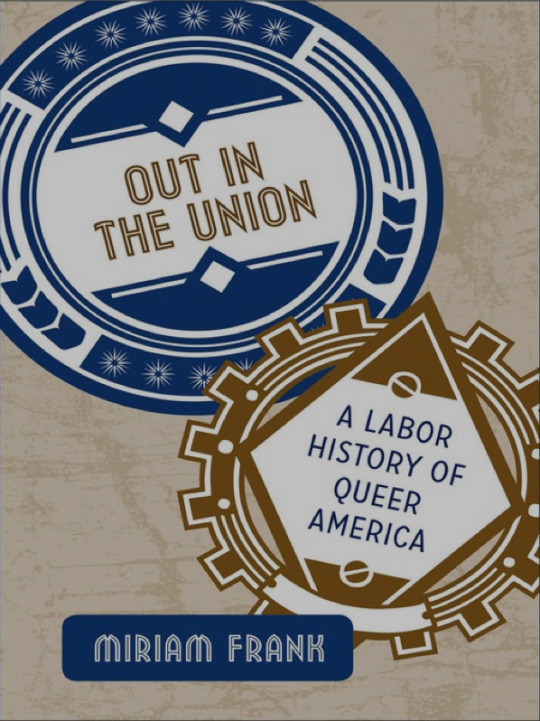
Out in the Union: A Labor History of Queer America by Miriam Frank

My Desire for History: Essays in Gay, Community, and Labor History by Allan Bérubé
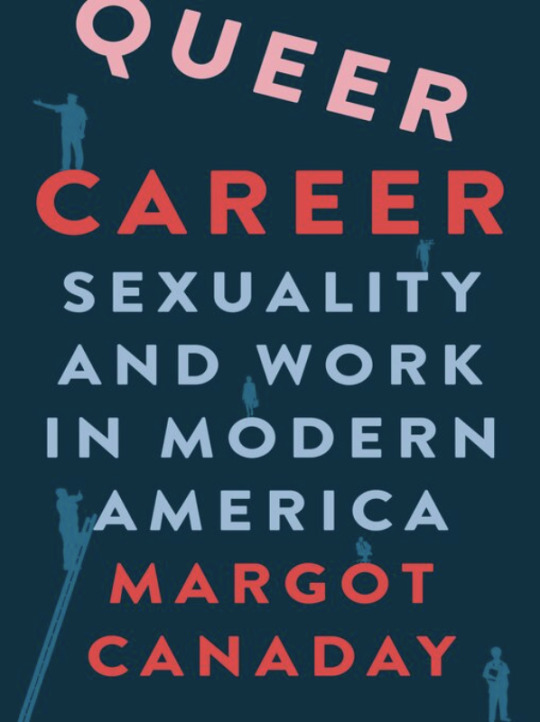
Queer Career: Sexuality and Work in Modern America by Margot Canaday
#queer liberation library#qll#queer books#labor rights#labor history#international workers day#may day
225 notes
·
View notes
Text
From the Seattle IWW, written by FW Noah in 2022: "The True History of May Day."
In the United States and many other countries, there are labor days that celebrate the working class contributions to the economy, the infrastructure, and the nation as a whole. While many of these holidays give great praise and pomp towards working class people, they often overlook the history that led up to the foundation of such celebrations, and what the foundations were really laid upon. Much of the early labor history is filled with great strife, conflict, death and destruction often directed towards working class individuals, who attempted to organize their lives in a way to break off the shackles of exploitation and capitalism as a whole.
May Day began as a remembrance of the Haymarket Affair of 1886, when several anarchists who were supporting a protest for the 8 hour day in the city of Chicago were falsely accused by the police of detonating a bomb, and were executed as a result despite nationwide demands for their clemency. Since that day, every May the 1st became a day of celebrating the toil and contributions of workers in society and the struggle for better working class conditions, and uplifted the voices of those who were often marginalized or ignored by the upper classes. However, the United States of America has a different official Labor Day, established by the federal government in 1894. The change in date was intended to distract workers from the more radical origins of the holiday. This began a trend in the larger labor movement away from uniting the working class as one body with common interests and towards formalizing relations between a disadvantaged class and those with the power and wealth to decide the course of negotiations.
151 notes
·
View notes
Text

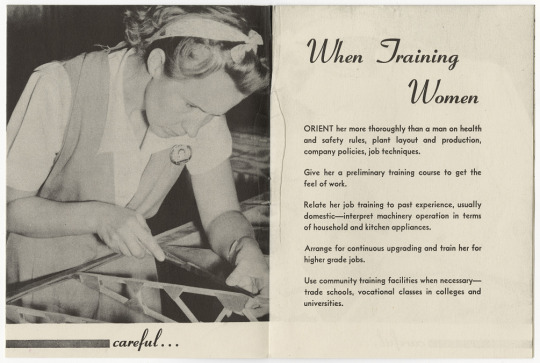

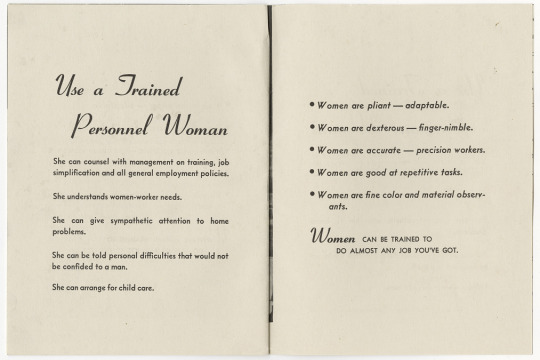
Some handy tips from the War Department’s “You’re Going to Employ Women” pamphlet, April 1, 1943.
Unfortunately, this is not a joke.
Record Group 407: Records of the Adjutant General's Office
Series: Central Decimal Correspondence Files
File Unit: 291.9 Status of Women 1-1-42 THRU 12-31-45
Transcription:
(a pamphlet with single staple on left side, off-white paper)
You're Going to Employ Women
WAR DEPARTMENT
WASHINGTON, D. C.
(In pencil along right side) WGCS 17, 291.9, (4-1-43)
[page 2]
(left page black and white photo) woman filing a piece of metal
_______________careful...
(right facing page)
(title) When Training Women
ORIENT her more thoroughly than a man on health and safety rules, plant layout and production, company policies, job techniques.
Give her a preliminary training course to get the feel of work.
Relate her job training to past experience, usually domestic--interpret machinery operation in terms of household and kitchen appliances.
Arrange for continuous upgrading and train her for higher grade jobs.
Use community training facilities when necessary--trade schools, vocational classes in colleges and universities.
[page 3]
(Left side same woman)
_____________and conscientious...
(Right side)
(title) When Working Woman
LIMIT her hours to 8 a day and 48 a week.
Schedule short morning and afternoon rest intervals on arduous jobs.
Have diet-balanced luncheons available--and extra food on exhausting jobs.
Provide ample clean toilets and rest rooms--good plant ventilation free of dust, fumes and drafts--work seats and benches at proper height--clean orderly surroundings--safety devices on machinery.
Insist on proper work clothing, safe shoes.
Promote adequate local housing and transportation.
And…
[page 4]
(Left side of page)
(title)
Use a Trained Personnel Woman
She can counsel with management on training, job simplification and all general employment policies.
She understands women-worker needs.
She can give sympathetic attention to home problems.
She can be told personal difficulties that would not be confided to a man.
She can arrange for child care.
(right facing page)
-Women are pliant--adaptable.
-Women are dexterous--finger nimble.
-Women are accurate--precision workers.
-Women are good at repetitive tasks.
-Women are fine color and material observants.
Women CAN BE TRAINED TO DO ALMOST ANY JOB YOU'VE GOT.
#archivesgov#April 1#1943#1940s#WWII#World War II#women's history#labor history#captain america chair dot gif
669 notes
·
View notes
Text

"Workers, do not be deceived: it is the great struggle: parasitism and labor, exploitation and production are at death-grips. If you are sick or vegetating in ignorance and squatting in the muck; if you want your children to be men gaining the reward of their labor, not a sort of animal trained for the workshop and for war, fertilizing with its sweat the fortune of an exploiter, or pouring out its blood for a despot; if you want the daughters whom you cannot bring up and watch over as you would, to be no longer instruments of pleasure in the arms of the aristocracy of wealth; if you want debauch and poverty no longer to drive men to the police and women to prostitution; if, finally, you desire the reign of justice, workers, be intelligent, arise! And let your stout hands fling beneath your feet the foul reaction! ...Long live the Republic! Long live the Commune!"
--Statement of the Central Committee of the National Guard of the Paris commune on April 5, 1871.
The National Guard of the Commune was not the same as the old government's army that defended bourgeois interest; the National Guard of the Commune consisted of the workingmen of Paris. Their officers and Central Committee were democratically elected and subject to recall if they lost the confidence of the people.
The Paris Commune started today, March 18, in 1871. At the time the working people of Paris were driven to poverty and starvation by the war with Prussia. On this day in 1871 the people of Paris--especially women and children--chased out the bourgeois government, who ran away pitifully with their tails between their legs to Versailles, leaving the city to the control of its workers. The workers of Paris established their own government that sought not to merely address urgent and base concerns such as hunger, rent, and unemployment, but also to found a kinder society by radicalizing institutions such as education or the concept of the family. It was the first attempt at a workers' state in history.
The Commune lasted for only 72 days, when the French government violently and ruthlessly crushed it. They brutally massacred the workers in the event that is known as Bloody Week. Historian Donny Gluckstein wrote: "Bloody Week was a graphic example of a capitalist state stripped to its bare essentials--'armed bodies of men'--exterminating a threat to the system of domination and exploitation." Paris suffered a labor shortage after this massacre.
We remember the Paris Commune, its principles, and its battle. Even today we sing the Internationale, a product of that relentless hopeful spirit of the Commune and its people who dared to believe a kinder world was possible--if only we fight for it.
Picture is the Communards Wall at the Père Lachaise Cemetery, where workers of the Commune were killed by bourgeois forces. People still leave flowers every year.
648 notes
·
View notes
Video
not having to work in a factory as a child
#tiktok#british history#social housing#trade unions#NHS#verso books#labor history#working class history#working class#history#labor vs capital#labor movements#labor movement#collective action
347 notes
·
View notes
Text
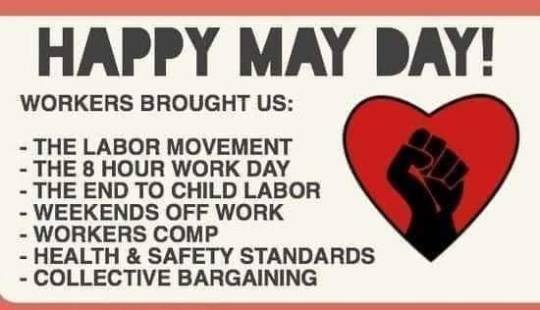
61 notes
·
View notes
Text
On This Day In History
January 5th , 1914: The Ford Motor Company announces the 8-hour-workday and a minimum wage of $5/day.
The US Bureau of Labor Statistics says that $5 in January 1914 has the same buying power as $153.53 in November 2023, most recent data. This would be a minimum wage of $19.19/hour.
143 notes
·
View notes
Text
Most Americans don't realize that the Railway Labor Act (1926) is the earliest formal recognition of organized labor in the US, and that it predates the National Labor Relations Act (1935) by nine years. Before that, they just sent the national guard to shoot you in the head if you struck. But the rail workers kept striking anyway, so...
#labor#labor history#railway labor act#national labor relations act#rail#rail workers#rail strike#500
958 notes
·
View notes
Note
Can I ask why the Pinkerton agents get such a bad rap online? All I know from them comes from the Sherlock Holmes novel The Valley of Fear, where they help take down a gang of extorsionist coal miners.
So the Valley of Fear concerns a real-life incident that helped to shape the Pinkertons' reputation: their destruction of the Molly Maguires in the coalfields of Pennsylvania. An early trade union of miners of mostly Irish extraction, the leadership of the Molly Maguires were accused of murder, arson, kidnapping, and a whole host of other crimes by undercover Pinkerton agents who had infiltrated their ranks on behalf of the Philadelphia and Reading Railroad, who the Molly Maguires were fighting over wages, hours, and working conditions. Dozens were sent to jail for long stretches of time, and ten men were ultimately hanged as a result of Pinkerton testimony.

The fact that the evidence against the Maguires largely stemmed from undercover informants paid by management to disrupt and destroy their organization and other suspect sources of evidence like jaihouse snitches, and that the prosecutions against the Maguires were personally carried out by the CEO of the Philadelphia and Reading Railroad in the midst of labor conflict over who ran the coalfields, has led a lot of labor historians to conclude that the Molly Maguires were stitched up in the courts and that the Pinkertons committed wholesale perjury, acted as agents provocateur to provoke the crimes they then testified to, and caused the judicial murder of ten men.
That was just the start of their long and inglorious history of being the favorite goons of anti-union robber barons: the gun thugs who were outfought at Homestead were Pinkertons, as were the private armies who fought for capital during the Great Railroad Strike of 1877 who had to be once again bailed out by the National Guard. Likewise, their foray into bearing false witness continued with the manufactured confession that named UMW leader Big Bill Haywood as the man who arranged for the assassination of Governor Frank Steunenberg of Idaho.
So yeah, the Pinkertons have earned every last drop of their evil reputation. There is blood on their hands.
989 notes
·
View notes
Text

The Working Class and the employing class have nothing in common.
There can be no peace so long as hunger and want are found among millions of the working people and the few, who make up the employing class, have all the good things of life.
Between these two classes a struggle must go on until the workers of the world organise as a class, take possession of the means of production, abolish the wage system, and live in harmony with the earth.
#Workingclass #LaborHistory #IWW #ClassWar #WageSlavery
#workers rights#working class#labor history#iww#iwa#asf#class war#wage slavery#ausgov#politas#auspol#tasgov#taspol#neoliberal capitalism#australia#fuck neoliberals#anthony albanese#albanese government#class warfare#classism#classwar#humanrights#chattel slavery#slaves#slavery#slave#antifa#antifascist#antiauthoritarian#antinazi
93 notes
·
View notes
Text
Almost 200 years since the first mill strike in the United States, which took place in my ancestral hometown of Pawtucket, Rhode Island, in 1824:
In late May 1824, a group of Pawtucket mill owners decided to make some drastic changes. Citing a “general depression,” they announced a plan to extend the workday by an hour, reduce the worker’s mealtime, and cut wages by 25%.
Workers in town did not accept these new conditions. About one hundred women walked out of the mills, causing them to shut down. From May 26th to June 3rd, 1824, a large number of additional textiles workers joined them in going on strike.
It was specifically women workers who were targeted by the mill owners, who claimed they made what was "'generally considered to be extravagant wages for young women.' The owners believed the young women would passively accept such wage decreases." The Pawtucket Mill Strike would inspire other working class uprisings such as Rhode Island's Dorr Rebellion.
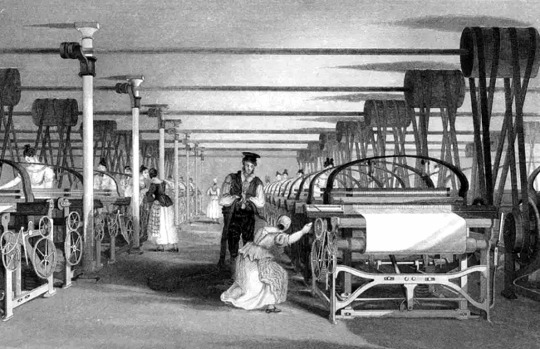
Power looms in 1835: illustration from NPS article.
#may day#labor history#labour history#1820s#mill strike#pawtucket#rhode island#new england#mayday#working class#history#textiles#us history#classism#blackstone river valley#blackstone river
91 notes
·
View notes
Text

(Pictured: Carnations laid in honor of the dead at the sidewalk of NYU's Brown Building. Photo by Leanna Renee Hieber)
On March 25, 1911, a fire broke out on the top floors of the Asch Building. The Triangle Shirtwaist Factory Fire took the lives of 146 people, most of them women and girls. As a NYC tour guide of over 15yrs, I speak about this site with vehemence. Never forget the importance of modern labor laws and the lives lost before we gained these rights. Andrea Janes and I wrote about this site, and its importance in the capacity of residual haunting, in our book A HAUNTED HISTORY OF INVISIBLE WOMEN. Our chapter on the fire, Industrial Monsters, is up on the Boroughs of the Dead blog: https://boroughsofthedead.com/industrial-monsters-ghosts-of-the-triangle-shirtwaist-factory/
Please support union workers and legislation aimed at shoring up worker protections. Honor the dead.
#nychistory#a haunted history of invisible women#on this date#labor history#trianglefire#triangle shirtwaist factory fire#factory#haunting#hauntedhistory#tour guide#new york history#labor law#labor rights#unionize
114 notes
·
View notes
Text
Oct 4 (Reuters) - A tight U.S. labor market, the expiry of union contracts and high living costs have led to tough negotiations for pay hikes and benefits from workers and triggered strikes and protests across industries.
Nearly 309,700 workers have been involved in work stoppages and strikes through August this year, according to preliminary data from the U.S. Bureau of Labor Statistics, putting 2023 on track to becoming the busiest year for strikes since 2019.
#news#hot strike summer#hot strike fall#hot labor summer#hot labor fall#us news#uspol#unions#union strong#workers rights#worker rights#labor history#us labor unions#labor unions#us labor#us pol
89 notes
·
View notes